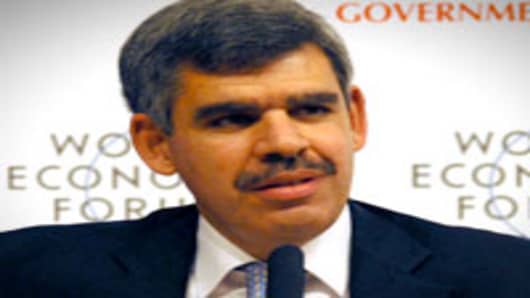An extended period of "financial repression"—brought on by low interest rates—means investors will have to do what they can to get income while keeping up a strong defense against global slowness, Pimco's Mohamed El-Erian told CNBC Monday.
Portfolios should include a healthy mix of stocks, fixed income and foreign exchange currencies that keep investors exposed to growing parts of the world and protected against debt-burdened areasthat won't do as well, the co-CEO at the world's largest bond fund said in a live interview.
"If you look at the advanced economies, the US is the cleanest dirty shirt. It is not purely clean, but it is cleaner than what you see in Europe, than what you see in Japan," El-Erian said.
"Quite a few companies have very strong balance sheets (and) operate in places where there aren't many questions about the rule of law but are exposed to the parts of the world that are growing very heavily," he added. "I think investors are starting to realize that that is a good way also of getting exposure to emerging markets."
As policy makers continue to try to guide the economy back to recoveryfrom the depths of the financial crisis, investors face unusual choices because of low interest-rate policies from the Federal Reserve and other central banks, El-Erian said.
The Fed in recent months has stated its commitment to keep its funds rate near zero for the next two years. Chairman Ben Bernanke said he remains unconvinced that employment will see any strong gains and expects slow growth ahead for the U.S.
"We are living in what is called 'financial repression,' where the Fed is keeping rates artificially low in order to bolster debtors, and it is creditors that are paying the costs for that," El-Erian said. "That is what is being done to deal with the debt overhang and at the same time to try and promote growth."
While U.S. stocks are in a bull-market rally, other markets around the world have done even better.
Russia, for instance, has gained 23 percent this year, while India stocks have risen 26 percent and the German market is up 18 percent.
Investors need to identify those growth markets and find companies that have exposure there both on the debt and equity side, El-Erian added.
"You want a solid balance sheet. We are still going to go through many years of (debt reduction) and you have to have that balance sheet defense," he said. "You want offense on one side, and defense, and you can combine them both in quite a few companies both here and around the world."




